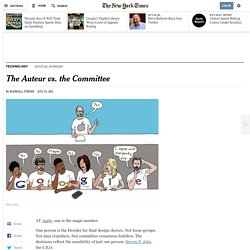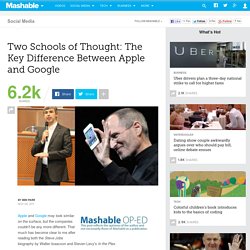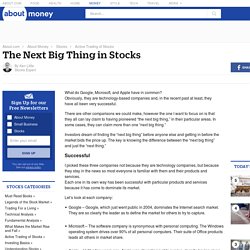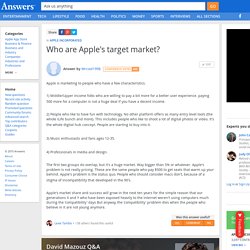

What Apple Has That Google Doesn’t: An Auteur. Photo AT , one is the magic number.

One person is the Decider for final design choices. Not focus groups. Not data crunchers. Not committee consensus-builders. By contrast, has followed the conventional approach, with lots of people playing a role. The contest is not even close. Two years ago, the technology blogger John Gruber presented a talk, “The Auteur Theory of Design,” at the Macworld Expo. The auteur, a film director who both has a distinctive vision for a work and exercises creative control, works with many other creative people. “The quality of any collaborative creative endeavor tends to approach the level of taste of whoever is in charge,” Mr.
Two years after he outlined his theory, it is still a touchstone in design circles for discussing Apple and its rivals. Garry Tan, designer in residence and a venture partner at Y Combinator, an investor in start-ups, says: “Steve Jobs is not always right—MobileMe would be an example. Apple vs. Google: By the Numbers. Two Schools of Thought: The Key Difference Between Apple and Google. Apple and Google may look similar on the surface, but the companies couldn't be any more different.

That much has become clear to me after reading both the Steve Jobs biography by Walter Isaacson and Steven Levy's In the Plex. Google and Apple are technology behemoths that bucked the system, created game-changing products and are worth more than $550 billion collectively. Both companies have successful mobile phone divisions and web browsers, and both companies have a common enemy in Microsoft. The two companies are built on completely different foundations, though. Sergey Brin and Larry Page firmly believe in the power of data and numbers, and that reliance on the metrics is the cornerstone of every major decision the company makes.
Steve Jobs, on the other hand, believed in the power of design and often threw out the data. There is no starker contrast of the ying-yang battle of data vs. design. Google: Data Is King. What Apple, Google, Microsoft have in Common - the Next Big Thing from Google, Microsoft, Apple. What do Google, Microsoft, and Apple have in common?

Obviously, they are technology-based companies and, in the recent past at least, they have all been very successful. There are other comparisons we could make, however the one I want to focus on is that they all can lay claim to having pioneered “the next big thing,” in their particular areas. In some cases, they can claim more than one “next big thing.” Investors dream of finding the “next big thing” before anyone else and getting in before the market bids the price up. The key is knowing the difference between the “next big thing” and just the “next thing.”
Successful I picked these three companies not because they are technology companies, but because they stay in the news so most everyone is familiar with them and their products and services. Each one in its own way has been successful with particular products and services because it has come to dominate its market. Let’s look at each company: Elements of Success. Google. Apple (United Kingdom) — Shop for Your Business.
Country Selector - Apple. iPhone:Target Audience. Who are Apple's target market. Apple is marketing to people who have a few characteristics. 1) Middle/Upper income folks who are willing to pay a bit more for a better user experience. paying 500 more for a computer is not a huge deal if you have a decent income. 2) People who like to have fun with technology.

No other platform offers as many entry level tools (the whole iLife bunch and more). This includes people who like to shoot a lot of digital photos or video. It's the whole digital hub concept. 3) Music enthusiasts and fans ages 12-35. 4) Professionals in media and design. The first two groups do overlap, but it's a huge market. Apple's market share and success will grow in the next ten years for the simple reason that our generations X and Y who have been exposed heavily to the internet weren't using computers much during the 'compatibility' days But anyway, the 'compatibility' problem dies when the people who believe in it are not young anymore.
APPLES TARGET MARKET - APPLE INC. CASE STUDY.